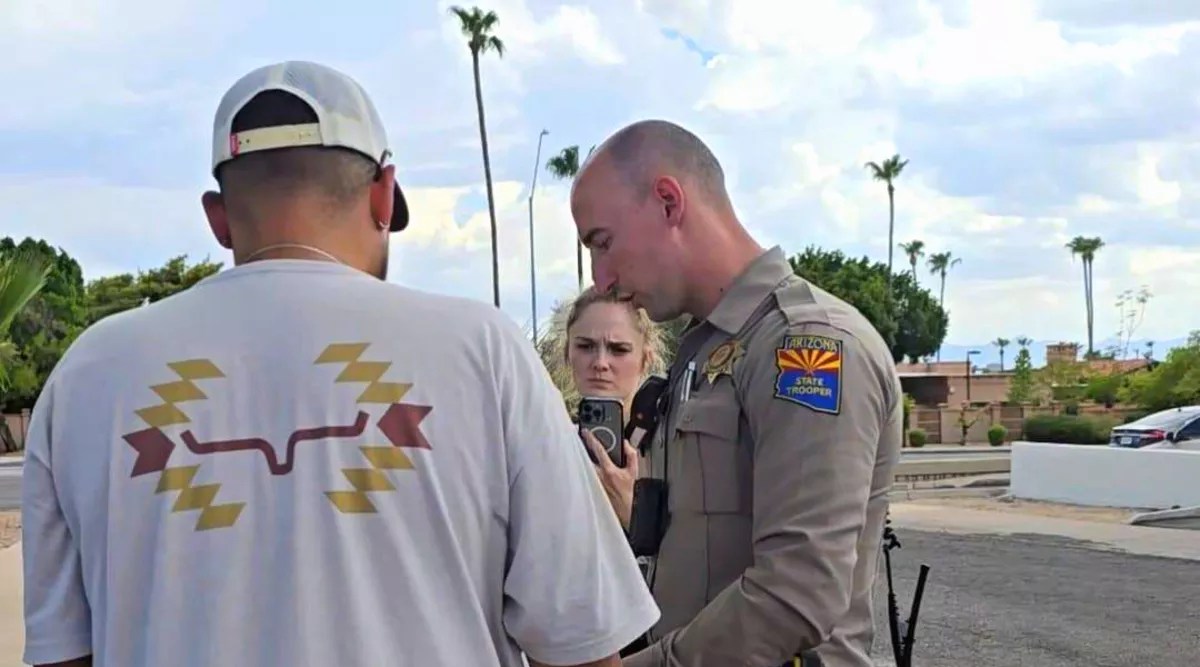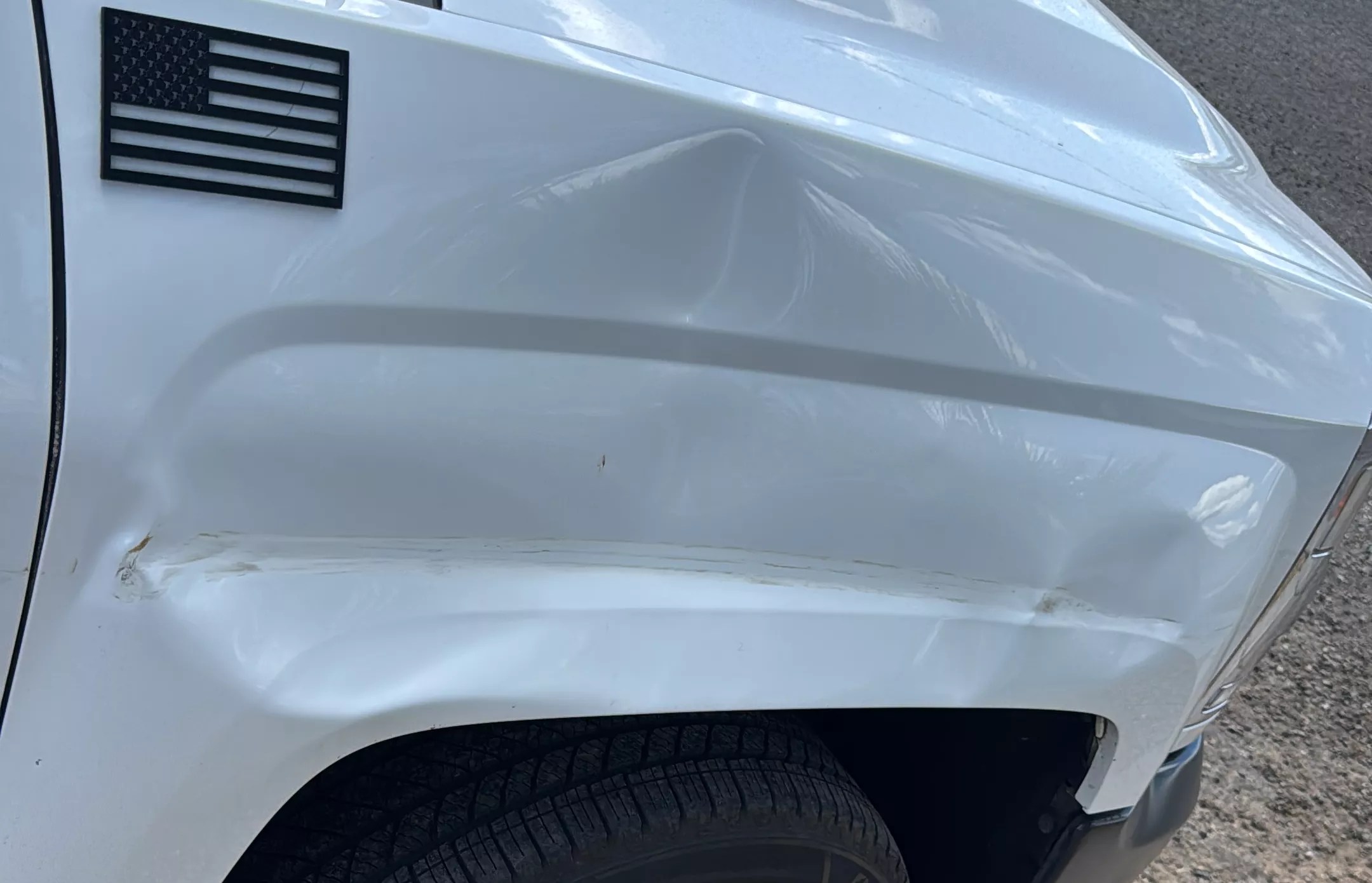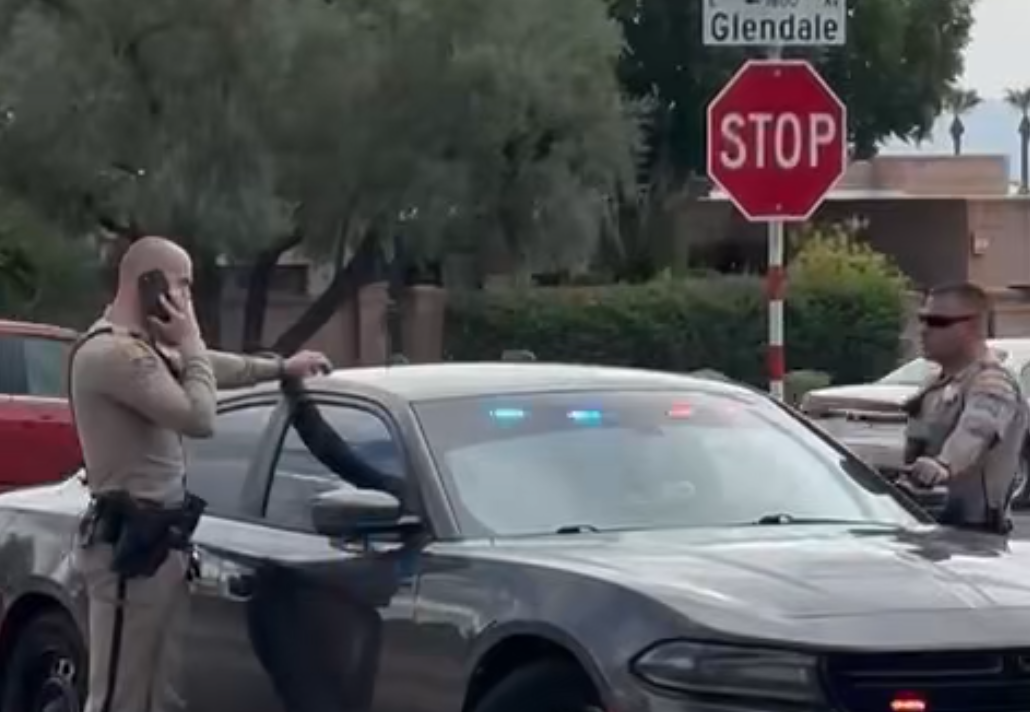
Courtesy photo

Audio By Carbonatix
Editor’s note: This story has been updated to include a statement from a spokesperson for Gov. Katie Hobbs.
***
The sky was calm and overcast on the afternoon of July 22 as Julio drove his Chevy Silverado pickup southbound on State Route 51, a trailer of paint supplies rumbling over the pavement in his wake. He’d just finished one paint job and was heading into central Phoenix for another when he heard a thud on the passenger side of the truck.
Another driver had side-swiped the truck, leaving a “big dent on the fender,” Julio told Phoenix New Times. Both drivers pulled off the freeway at the Glendale Avenue exit to assess the damage and exchange contact information. Following the advice of his brother and for insurance purposes, Julio also called 911 so that a law enforcement officer could file a report.
What transpired next brought Julio – who requested that his last name be withheld from publication because he is undocumented and fears retaliation – uncomfortably close to deportation. A literal fender bender, for which he was not at apparent fault, ended with an Arizona Department of Public Safety trooper calling Immigration and Customs Enforcement. The trooper even briefly detained (but didn’t handcuff) the 30-year-old so that ICE could have the chance to pick him up.
“I can’t even trust the police anymore to do their jobs. How can I feel safe now just calling the cops in any situation?” Julio told New Times. “I didn’t cause the accident. All I was trying to do was the right thing, sticking to the law.”
That DPS alerted immigration authorities at all is notable and seemingly against the department’s policy.
In a June 19 release, DPS clarified its involvement with ICE, stating that it “does not engage in direct immigration enforcement” and added that “investigations focus on criminal conduct, not an individual’s immigration status.” In that same statement, DPS Director Jeffery Glover stated that “if an individual’s immigration status becomes relevant due to a state crime, we may notify federal partners.”
That caveat would not seem to apply to Julio, who was merely seeking an accident report. Though Julio was ultimately released at the scene by DPS, immigration advocates say such interactions make immigrants scared to seek help from local police and undermine public trust in law enforcement.
“(Immigrant communities) are afraid to report crimes because they could get deported,” said Clarissa Vela, a paralegal and organizer with People First Project. “If the police are going to ask us to try to improve public trust… how are we supposed to do that if they have officers who are engaging in racist policing?”

The damage to Julio’s truck.
Courtesy photo
The accident and aftermath
It’s not clear if the DPS trooper called ICE on Julio for racist reasons, as Vela suggested. But it’s also not clear why ICE had to be contacted at all.
When he arrived, the responding trooper asked both drivers for identification and registration. Julio handed over a Mexican driver’s license. Though it’s legal to drive with a foreign license in Arizona, the trooper then asked Julio if he had an Arizona ID. Julio responded that he did not and then volunteered information that might have triggered a call to ICE.
After supplying the trooper with his place and date of birth and his address, Julio told the trooper that he had an open immigration case. His mother became a naturalized citizen in 2016 and sponsored Julio for a green card, a process that is still pending. Julio told New Times he was born in Mexico City and has been living in the U.S. for about four years, though he has lived in Arizona off and on since he was a teenager.
Relaying his story to the DPS trooper, however, Julio made a mix-up committed by many when discussing the various federal immigration agencies. Instead of telling the trooper that he had an open case with U.S. Citizenship and Immigration Services, which handles green card cases, Julio mistakenly told the trooper that he had an open case ICE, which arrests and removes immigrants from the country.
Julio said he handed the officer his immigration papers, which he keeps folded up in his wallet on the advice of his lawyer. The trooper took the papers to his patrol vehicle for about 20 minutes. When he returned, he handed both drivers a document with each other’s information on it and said the other driver could leave. Julio, however, had to stay because ICE wanted to question him.
The trooper had Julio speak with an ICE agent on his personal cell phone, Julio said. Three other DPS troopers had joined the scene. The ICE agent asked Julio for his full name and date of birth, which Julio supplied. When the agent asked Julio where he lived, Julio stopped and told the agent he had the right not to answer questions. The agent agreed but said someone would come to his location if he didn’t answer. Julio said the agent then quickly changed the subject and began asking Julio about leaving and entering the country.
“The only question I have is if I’m being detained or if I’m under arrest,” Julio recalled telling the agent over the phone. “And then (the ICE agent) said straight, ‘No.’ And then after, the trooper said, ‘He’s not detaining you, but I’m detaining you, so I’m telling you that you cannot leave.”
DPS spokesperson Bart Graves wrote to New Times that the trooper involved “followed protocol.” Graves confirmed the trooper “contacted ICE” after Julio “disclosed” that he “had an ongoing and current case with ICE” – repeating Julio’s apparent misidentification of USCIS. Per Graves, ICE told the trooper that ICE “would like to take the person into custody due to failing to follow a deportation order.”
Julio told New Times that he does not have a deportation order and said he hasn’t ever been before a judge in his immigration case. An immigration case lookup using his information returned no cases. Additionally, Julio said, “I have no criminal record.” Tuesday’s incident was Julio’s first run-in with police, he said.
ICE did not respond to questions from New Times about the interaction and whether there is a deportation order for Julio.

Multiple troopers ultimately responded to the site of a fender bender that resulted in an Arizona Department of Public Safety trooper calling immigration agents.
Courtesy photo
‘A bunch of white people started popping out’
During the interaction with the DPS trooper, Julio was in contact with his brother, Oscar, an activist connected with Valley immigration rights groups such as People First Project, Puente and Semillas Arizona. Oscar reached out to the hotline of these groups’ rapid response networks and “a bunch of white people started popping out,” Julio said. “Everyone started recording and everything.”
Among them was Sam Cooley, an organizer with People First Project and Desert Democracy Indivisible. She received a message about the situation a few minutes before 3:00 p.m. and immediately drove about 15 minutes to Julio’s location. When she arrived, she parked a block away and walked past the four DPS officers who she said were huddling around a vehicle, looking at something. Cooley said she asked the troopers if Julio – whom she had never met – was being detained. “No,” they responded, according to Cooley.
“Well, he’s leaving with me right now,” Cooley told officers.
She then told Julio to park his car in a nearby parking lot to be picked up later in the day. She then escorted him to her car with the help of two other rapid responders, whom Cooley described as “a gray-haired grandma and her husband.” As they began to walk away, a trooper gave Julio the documentation from the accident, which was the piece of paper that he had needed for his insurance and the purpose of his 911 call.
Cooley then drove Julio to a separate location to hand him off to his brother.
“As white people, we have to stand up for these people who don’t think they have any rights,” Cooley said. “Julio, honestly, did not think he had rights.”
Graves said DPS released Julio because ICE took too long to arrive. “Proper DPS protocol is not to unreasonably extend a stop or investigation for the purpose of immigration related activities,” Graves wrote. He added that “if a Trooper has reasonable suspicion a person is unlawfully in the county, they shall attempt to verify status” as long as it’s “not unreasonably extended.”
New Times reached out for comment on the incident to the office of Gov. Katie Hobbs, who appointed the head of DPS. Hobbs spokesperson Christian Slater responded that Arizona law requires DPS troopers to “attempt, when practicable, to contact immigration officials” when they have a reasonable suspicion that a person is illegally present in the country. Slater added that the trooper “had reasonable suspicion after the individual voluntarily self-disclosed involvement with ICE.”
“The governor has made clear she will use state resources to stop crime and secure the border and believes President Trump should follow through on his promise to focus on deporting violent criminals,” Slater concluded. “She will not use state resources to indiscriminately round people up, go after Dreamers, or attack people who have lived in their community for years, pay taxes, and follow the rules.”
Out of fear of being arrested, Julio hasn’t been home since the run-in with DPS. He has been back to work, painting homes in Scottsdale. He said his current customer promised to protect him.
He’s less confident that state or local police would do the same.